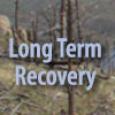Definition: The study of the interactions between fire and living organisms and their environment.
(National Wildfire Coordinating Group/Fire Research And Management Exchange System)
Fire ecology is a branch of ecology that concentrates on the origins, cycles, and future stages of wildland fire. It discovers and evaluates the relationship of fire with living organisms and their environment.
Upcoming Events
Announcements and Jobs
Recent Catalog Records
Document
2024







